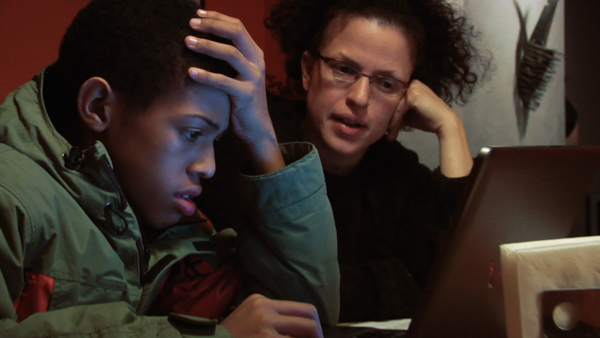Raising and educating middle-class African-American boys is seen first-hand, cinema verité style, over nine years in the fitful, occasionally insightful, and intimately revealing documentary American Promise.
Filmmakers Joe Brewster and Michèle Stephenson initially picked up their cameras, like so many parents do, when their son Idris headed off to kindergarten. They figured the experience would be more useful to document than the usual first-days-of-school because in 1999 he was going from their gentrifying Fort Greene, Brooklyn, neighborhood to the Dalton School, a century-old K-12 private school on Manhattan’s Upper East Side. The new students include Idris’s best friend, Oluwaseun, nicknamed Seun. They will help achieve, the admissions director says, the goal of 25 percent children of color. (While the parents make much of the almost hour commute, it’s not unusual in the city for parents and young kids to travel that long to even public schools of their choice.)
Their experiences—parents and children—unfold over the three acts of the boys growing up in school: the innocence of dealing with feeling different in the primary grades, the universal awkwardness of middle school, and the typical adolescent angst of high school, all edited to maximize the prism of race and gender. (The families of girls who originally participated in the film dropped out because of the intrusiveness of the cameras.)
The boys soon realize they look different than most of the other students and express discomfort at being the focus during history lessons on slavery. One meeting with other parents also participating in the integration experiment shows that their perspective is shared, but the boys’ individuality seems forced into generalities about what the filmmakers—and their funders—call “the black male achievement gap,” particularly in middle school. Even as it becomes painfully obvious on screen that the boys have learning disabilities, including dyslexia, that makes homework excruciatingly difficult, these parent/filmmakers bristle with resentment when Dalton recommends participation in the Tutoring Program.
The dad, Dr. Brewster, is a psychiatrist, and he clarified at the New York Film Festival press conference that studies have shown that African-American boys tend to be over-diagnosed with learning disabilities, then conceded that the film does not show all that Dalton did do to try to accommodate the boys’ problems, even though private schools are not obligated to, unlike public schools. Instead, on screen an academic counselor talks about such boys tending to “need extra help” and that African-American girls seem to be able to keep up. There are no comparisons with other boys on screen for more context.
For both boys, sports offer an alternative to academics, but not from social tensions. Seun tries to use karate as a release from frustrations, though he doesn’t progress as much as he would like. Idris’s pursuit of basketball provides a culture clash in his recreational league—“You talk like a white boy,” others say—and becomes yet another place for his parents to pressure him to succeed. Yes, it’s awkward that it’s the director criticizing his son’s “laziness,” but there’s also seemingly stereotyped expectations from Dalton that advances Idris to a varsity team before he’s probably ready.
By high school, Seun can no longer keep up with the rigorous academic load, and his parents transfer him to the Benjamin Banneker Academy for Community Development. The Brooklyn charter school is high on building up racial confidence for its majority African-American student body (he participates in a class trip to Africa), but it clearly has less challenging curriculum than Dalton and inadequate college counseling. The school does provide emotional support after a family tragedy sends him reeling.
Though the directors only briefly talk about their parents on screen, they cite inspiration from two longitudinal filmmakers: Michael Apted’s ongoing “7 Up” series and Steve James’ Hoop Dreams (1994). But the key to those groundbreaking films is that their directors have been able to maintain some objective distance despite getting close to their subjects. That is simply impossible in this intensely personal approach, which may be an unfortunate trend as there are similar failings in two recent documentaries of helicopter parents endlessly filming their children: Jeff Preiss’s Stop watching his child deal with transgender identity and Ross McElwee’s Photographic Memory, charting his son’s artistic development.
In association with the film’s debut on PBS next year, Dr. Brewster will release a companion book, Promises Kept: How to Help Black Boys Succeed in School and in Life- Lessons Learned from the 12-Year American Promise Project, and the film’s website will be expanded with expert year-by-year parenting advice on issues from playdates to teen sexuality. The directors seem to have ruefully learned from editing their 800 hours of footage that they could have used such advice.







Leave A Comment